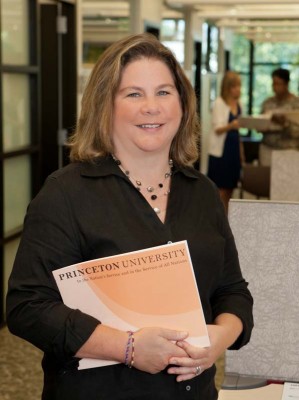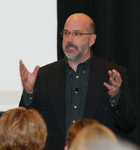The difference between Princeton and Harvard is often charted in terms of nuance, geography, and a twist of chutzpah: eight US presidents have graduated from Harvard; Princeton is associated with 35 Nobel Laureates; Harvard has the largest academic library in the country; Princeton has the largest per-student endowment; Harvard ranked first in the Academic Ranking of World Universities for 2011; and both Princeton and Harvard ranked first as a national university in U.S. News & World Report in 2011.
Despite the ongoing Ivy League contest, Profile wanted to take a look at the HR department at each university. Once inside, we learned the playing field is level. At both Harvard and Princeton, policies are centered not on conflict and one-upmanship, but on efficiency and a professional dynamism—built to compliment each school’s respective institutional legacy and, moreover, to contribute to the school’s influence within and beyond top-tier university HR administration.
Though HR challenges are always distinct, the needs and expectations articulated by the HR departments at Harvard and Princeton are one-in-the-same, requiring an energetic response to organization, communication, and institutional strategy. Profile recently sat down with HR leads at each university to learn about the differences—and similarities—of running an HR department at an Ivy League university.
Marie Bowen
THE HR LITIGATOR

“Within the organization, there are so many different lines of business that it sometimes makes the institution seem like a small city.”
You started working at Harvard in 2006. What were you doing before that?
I was working with the state government at the Massachusetts Port Authority, where I first started as an employment lawyer. While I was there, I ended up moving away from the legal side to the business side of things, where I then became the director of human resources. After I was there for a few years, I was ready to start looking for something that would give me the opportunity to learn a new business and have room for growth. Beyond that, I’ve always been interested in working with nonprofit and mission-driven
organizations, and I also wanted to stay in a unionized environment, because that really adds to the interests of the HR function.
And this is what Harvard had for you?
It was. I had actually gone to Harvard to study English as an undergrad, so I already valued the experience I had here, but I never really thought about going into HR. After law school, I worked as an employment litigator for over 10 years. The more I got into litigation, the more I saw an opportunity to help prevent problems on the business side before they got created. As I transitioned to the business side, I found myself enjoying it. Harvard was and is a great setting for me to develop my old skills and create new ones, as well.
 What were things you had to adjust for when you started at Harvard?
What were things you had to adjust for when you started at Harvard?
HR is a support department, and it exists in order to make life easier for its clients. You can’t do that unless you understand the needs of your clients, and so when I started at Harvard, I was able to engage clients from all departments. Within the organization, there are so many different lines of business that it sometimes makes the institution seem like a small city. Every constituent has a different HR need, and it’s always interesting for me to find ways to satisfy all of those needs.
What has changed in HR at Harvard since you began working there?
One major aspect has been the focus on performance evaluations. In 2007, we developed metrics to determine how many Law School staff members had an evaluation in the prior two or three years. It averaged about 40 percent. According to employee-engagement surveys, the staff—and management—wanted more feedback, and more merit-based decision making about employee benefits and so forth. We launched an initiative to increase participation in the process here at Harvard Law School, and participation jumped to 80 percent in the first year. Five years later, more than 90 percent of the staff now participates in evaluations. With strong evaluative tools and programs, the process practically runs itself, though we’re focusing on improving the quality of the evaluations, improving their meaningfulness, and promoting dialogue.
And you do more than HR work?
My HR-specific work is the substantive work that operationally drives the HR functions at the school, but I also participate on the leadership team at Harvard Law School, which is a really vibrant and highly motivated group of people who work together on a broader sense of initiatives. These don’t always directly relate to HR, but they do help enhance the infrastructure at the school so that all of our functions can benefit from a culture that is aligned with what we’re doing at a strategic level.
Does this enhanced managerial function play into people’s changing views of HR in the workplace?
Yes—it’s actually part of what got me interested in HR in the first place. In employment law, I was able to see what happens when things aren’t managed well, and I gained a bird’s-eye view on how things could have been managed differently. Having this perspective makes it much more interesting to be in the field. HR now seems to be viewed as more of an impact player that can help people prevent the kind of problems that might distract them from their core mission. It’s much better to stay focused on strategy than cleaning up personnel issues that could have been avoided in the first place.
One of the nation’s leading, not-for-profit health plans, Harvard Pilgrim Health Care’s mission is to improve the quality and value of health care for the people and communities we serve. Providing a variety of benefit options and funding arrangements to more than one million members in Massachusetts, Maine, and New Hampshire, Harvard Pilgrim has been nationally recognized for outstanding performance in clinical quality and member satisfaction. With innovative approaches to health improvement and disease management, unique online tools that speed and simplify key transactions for employers and providers, and personalized member health support, Harvard Pilgrim is again the number-one private health plan in America, according to an annual ranking of the nation’s best health plans by the National Committee for Quality Assurance.
Lianne Sullivan-Crowley
THE PEOPLE EMPOWERER

“Most corporations have a bottom line concerned with a product. In academics, people are the product.”
When you were planning your career, did you always have it in mind to work in HR?
Like most everyone else, I came into it by accident. I originally went to school to be a teacher, but when I graduated, it was a tough time for teachers, so I became a management trainee in the hotel industry. It was the early 1980s, and the way the training program was set up at that time was to give you an opportunity to work every job in the hotel, from cleaning to front-desk manager. At the end of your program, you got to choose which discipline you wanted. I almost chose housekeeping, because the director was such a dynamic manager, but I realized that what I really enjoyed was the management of people and system dynamics within organizations, and instead chose HR.
What did you do when you realized this?
As part of the trainee program, I worked in the HR office, where I once sat in on a negotiation session between the hotel and the union. A corporate attorney led the negotiations, and, while I was in the room, I thought, “I can do what this attorney is doing.” At that moment, almost on a whim, I thought I should go to law school. At the end of the training program, I worked in the HR department in the Boston hotel for a year. Later, when given an option to relocate to Tennessee or Montana, I chose law school instead. I needed to find a job that would allow me the flexibility to attend law school in the evening. So that’s how I got hired at Harvard—I was lucky enough to find a position there as a staffing specialist.
Is having legal experience valuable for HR work?
I think that it’s not only valuable, but also integral. There are a lot of laws that impact HR practices. Whether you’re hiring, promoting, disciplining, or firing, you need to abide by rules beyond your institution’s policies. Most institutions—especially academic institutions—have a much a higher standard for treating employees well. I don’t think a JD is always required, but it is important for members of an organization to have an understanding of the implications of the law within that organization.
 It seems that the HR functions between higher education and corporate business are similar in this way.
It seems that the HR functions between higher education and corporate business are similar in this way.
It is the mission of academy that drew me to working in higher education and keeps me working there. HR is fundamentally the same in both environments: it’s concerned with the experience of the people who do the work. The difference involves the fact that most corporations have a bottom line concerned with a product. In academics, people are the product. Our faculty is the reason that students come to Princeton. The students come here to learn with the faculty that teach and do research here, so our investment in our people is critical. This extends all the way to the dining-service workers, who are—in many ways—also a critical part of the student experience.
Is this view of HR an element of how the role of HR has been evolving within institutional contexts?
Over the past 15 years, rather than acting as the police, HR has become a much more strategic partner within the institution. I can personally attest to this as someone who has not only worked for various institutions, but also from the vantage point of my role on the National Board of Directors for the College and University HR Association. Especially in organizations where people are the capital, as at a university, there is a growing recognition that it is important to have a voice at the table representing the people of the organization. The better your employment experience is, the better morale is, and the better your product is. It makes a huge difference.
How does this active role within administration inform the goals you have for your own work at Princeton?
Higher education is in a transformative period right now. With online courses, like those developed by Coursera, involving Princeton and other universities, technology has become increasingly important. I plan to ensure that the administrative infrastructure continues to support teaching and research at Princeton University in whatever way it grows in the coming years.

